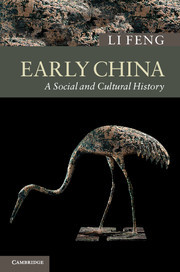Description
Early China
A Social and Cultural History
New Approaches to Asian History Series
Author: Feng Li
A critical new interpretation of the early history of Chinese civilization based on the most recent scholarship and archaeological discoveries.
Language: English
Subject for Early China:
Early China
Publication date: 11-2013
Support: Print on demand
Publication date: 11-2013
Support: Print on demand
Early China
Publication date: 12-2013
367 p. · 15.7x23.5 cm · Hardback
Publication date: 12-2013
367 p. · 15.7x23.5 cm · Hardback
Description
/li>Contents
/li>Biography
/li>
'Early China' refers to the period from the beginning of human history in China to the end of the Han Dynasty in AD 220. The roots of modern Chinese society and culture are all to be found in this formative period of Chinese civilization. Li Feng's new critical interpretation draws on the most recent scholarship and archaeological discoveries from the past thirty years. This fluent and engaging overview of early Chinese civilization explores key topics including the origins of the written language, the rise of the state, the Shang and Zhou religions, bureaucracy, law and governance, the evolving nature of war, the creation of empire, the changing image of art, and the philosophical search for social order. Beautifully illustrated with a wide range of new images, this book is essential reading for all those wanting to know more about the foundations of Chinese history and civilization.
Early China chronology; Map of China; 1. Introduction: early China and its natural and cultural demarcations; 2. The development of complex society in China; 3. Erlitou and Erligang: early states expansion; 4. Anyang and beyond: Shang and contemporary bronze cultures; 5. Cracking the secret bones: literacy and society in Late Shang?; 6. The inscribed history: Western Zhou State and its bronze vessels; 7. The creation of paradigm: Zhou bureaucracy and social institutions; 8. Hegemons and warriors: social transformation of the Spring and Autumn Period (770 BC–481 BC); 9. The age of territorial states: warring states politics and institutions; 10. Philosophers as statesmen: in light of recently discovered texts; 11. The Qin Unification and Qin Empire: who were the Terra-Cotta Warriors?; 12. Expansion and political transition of the Han Empire; 13. State and society: bureaucracy and social orders under the Han Empire; 14. Ideological changes and their reflections in Han culture and Han art.
Li Feng is Professor of Early Chinese History and Archaeology at Columbia University. Both a historian and an archaeologist, his research interests extend from bronze inscriptions and Western Zhou history to broader issues such as the nature of early states, bureaucracy, comparative literacy, cross-region cultural relations and theories of social development. He is also an active archaeologist with extensive fieldwork experience in China and Japan. Li's published English books include Landscape and Power in Early China: The Crisis and Fall of the Western Zhou, 1045–771 BC (2006), Bureaucracy and the State in Early China: Governing the Western Zhou (2008) and Writing and Literacy in Early China: Studies from the Columbia Early China Seminar (co-editor, 2011).
© 2024 LAVOISIER S.A.S.




